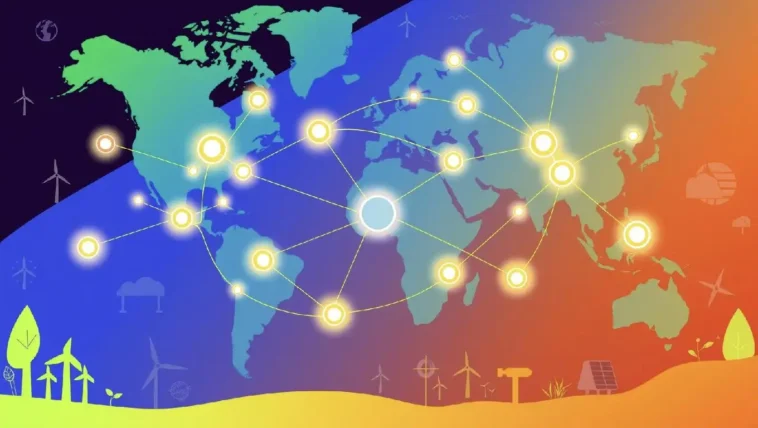Climate Change Cooperation
Global Leaders Unite: Pledging Climate Action & Energy Transition
Climate Change Cooperation is crucial for a sustainable future, and this article explores the latest global pledges to accelerate the energy transition and build climate resilience.Global Leaders Unite: A Bolder Front Against Climate Change – Is It Enough?
The world stands at a precipice. Climate change, once a distant threat, is now a harsh reality impacting every corner of the globe. From rising sea levels swallowing coastal communities to extreme weather events wreaking havoc on agriculture, the consequences of inaction are becoming increasingly dire. It is against this backdrop that global leaders have recently convened, pledging a renewed commitment to climate action. But is this “bolder cooperation” truly enough to turn the tide?
Ministers from 28 countries, Nigeria included, recently recommitted to exploring collaborative opportunities that will accelerate a just and equitable energy transition and advance climate resilience for populations in the Global South. The question isn’t whether these pledges are welcome, but whether they are ambitious and concrete enough to meet the scale of the challenge. Let’s dive into the specifics and assess the potential impact.
Nigeria’s Climate Crossroads: A Nation on the Frontlines
Nigeria, Africa’s most populous nation, finds itself in a particularly vulnerable position. Its vast coastline is threatened by rising sea levels, while its agricultural heartland faces increasingly erratic rainfall patterns and desertification. The economic consequences are stark, with livelihoods threatened and food security at risk. But Nigeria is not merely a victim; it is also an active participant in the fight against climate change.
The nation has committed to ambitious emissions reduction targets and is actively exploring renewable energy solutions. However, the path forward is fraught with challenges. Dependence on oil revenue, infrastructural deficits, and socio-economic inequalities all complicate the transition to a low-carbon economy. Can Nigeria truly balance its developmental needs with its climate responsibilities?
Nigeria’s bid to host the COP32 United Nations climate summit in Lagos in 2027 signals its ambition to play a leading role in global climate discussions. This move is not just about prestige; it’s an opportunity for Nigeria to showcase its commitment to climate action and to influence the global agenda. But can Nigeria convince the world that it is ready to lead by example?
Decoding the Pledges: Ambition vs. Reality
Global leaders have made numerous pledges, ranging from financial commitments to technological collaborations. However, a closer examination reveals a mixed bag of ambition and ambiguity. While some nations have significantly increased their climate finance contributions, others continue to lag behind, failing to meet their existing commitments. The devil, as always, is in the details.
Are these pledges truly additional, or are they merely re-packaged existing commitments? Are they focused on mitigation, adaptation, or both? And perhaps most importantly, are they accompanied by concrete implementation plans and accountability mechanisms? Without clear answers to these questions, the pledges risk becoming empty promises.
The table below highlights some key areas where commitments are needed:
| Area | Required Action | Potential Impact |
|---|---|---|
| Climate Finance | Increase funding for adaptation and mitigation in developing countries. | Enable vulnerable nations to build resilience and transition to low-carbon economies. |
| Renewable Energy | Accelerate the deployment of renewable energy technologies. | Reduce reliance on fossil fuels and decrease greenhouse gas emissions. |
| Policy and Governance | Implement strong climate policies and regulations. | Create an enabling environment for climate action and sustainable development. |
Beyond Fossil Fuels: Charting a Course for Sustainable Growth
The energy transition is arguably the most critical element of climate action. The world must rapidly move away from fossil fuels and embrace renewable energy sources. This transition presents both challenges and opportunities. For nations like Nigeria, heavily reliant on oil revenue, the shift requires careful planning and diversification.
Solar, wind, and hydro power offer viable alternatives, but significant investment is needed to develop the necessary infrastructure. Moreover, the transition must be just and equitable, ensuring that no one is left behind. This means creating new jobs in the green economy and providing support for communities that are negatively impacted by the decline of the fossil fuel industry.
Consider this: The shift to renewable energy could unlock new economic opportunities for Nigeria, creating jobs in manufacturing, installation, and maintenance. It could also improve energy access for millions of Nigerians who currently lack reliable electricity. The key is to create a supportive policy environment and attract the necessary investment.
Climate Resilience: Protecting the Most Vulnerable
Even with ambitious mitigation efforts, some degree of climate change is now unavoidable. This makes climate resilience a crucial priority, particularly for vulnerable communities in the Global South. These communities often lack the resources to cope with the impacts of climate change, such as droughts, floods, and extreme weather events.
Building climate resilience requires a multi-faceted approach, including investing in early warning systems, developing drought-resistant crops, and strengthening infrastructure. It also means empowering local communities to adapt to changing conditions and providing them with the resources they need to thrive.
Imagine a scenario where Nigerian farmers are equipped with drought-resistant seeds and access to irrigation systems. They would be far better positioned to withstand the impacts of climate change and continue to provide food for their communities. This is the power of climate resilience in action.
Financing the Green Revolution: Where Will the Money Come From?
Climate action requires significant financial resources. Developing countries need assistance to transition to low-carbon economies and build climate resilience. Developed countries have pledged to provide this assistance, but the reality has fallen far short of expectations. Unlocking investment for climate action is therefore a critical priority.
This requires a combination of public and private finance. Governments must increase their climate finance contributions, while also creating an enabling environment for private investment. This includes providing policy certainty, reducing regulatory barriers, and offering incentives for green projects.
Consider the potential of green bonds, which allow investors to finance environmentally friendly projects. Nigeria could issue green bonds to fund renewable energy projects, sustainable agriculture initiatives, and climate-resilient infrastructure. This would not only attract investment but also demonstrate the nation’s commitment to a sustainable future.
Tech to the Rescue? Innovations Sparking Hope in a Warming World
Technological innovation offers a glimmer of hope in the fight against climate change. From carbon capture technologies to smart grids and precision agriculture, new innovations are emerging that could help us mitigate emissions and adapt to changing conditions. But technology alone is not a silver bullet.
These technologies must be deployed rapidly and at scale. This requires investment in research and development, as well as policies that encourage innovation and adoption. Moreover, it is important to ensure that these technologies are accessible to developing countries, so that they can benefit from the latest advancements.
Imagine a future where carbon capture plants are sucking CO2 out of the atmosphere, turning it into useful products. Or where smart grids are optimizing energy consumption, reducing waste and improving efficiency. These are not just futuristic fantasies; they are real possibilities that could transform our world.
From Paper to Practice: Policies That Pave the Way
Effective climate action requires strong policies and governance frameworks. Governments must create an enabling environment for sustainable development, setting clear targets, implementing regulations, and providing incentives for green practices. International agreements also play a crucial role, setting global standards and fostering cooperation.
However, policies are only as good as their implementation. It is essential to ensure that policies are enforced effectively and that there are accountability mechanisms in place. This requires strong institutions, transparent processes, and active participation from civil society.
Think of carbon pricing mechanisms, which put a price on carbon emissions, incentivizing businesses to reduce their carbon footprint. Or regulations that require buildings to meet certain energy efficiency standards. These are just a few examples of how policies can drive climate action.
The Roadblocks Ahead: Navigating the Treacherous Terrain
The path to a sustainable future is not without its challenges. Political resistance, economic constraints, and technological limitations all pose significant obstacles. Overcoming these challenges requires a concerted effort from all stakeholders, including governments, businesses, and civil society.
Political resistance often stems from vested interests in the fossil fuel industry. Economic constraints can limit the ability of developing countries to invest in climate action. Technological limitations can hinder the deployment of certain solutions. But these challenges are not insurmountable.
By building broad-based coalitions, promoting sustainable development, and investing in research and development, we can overcome these obstacles and accelerate the transition to a low-carbon economy.
Nigeria’s Climate Destiny: A Call to Leadership
The future of global climate cooperation hinges on sustained commitment and ambitious action. Nigeria, as a major African nation, has a vital role to play. By leading by example, embracing renewable energy, building climate resilience, and advocating for international cooperation, Nigeria can help shape a more sustainable and equitable future.
The pledges made by global leaders are a step in the right direction, but they are not enough. We need bolder action, greater ambition, and a relentless focus on implementation. The time to act is now. The future of our planet depends on it.
What are your thoughts on the recent pledges for climate action? Share your opinions and join the conversation below!
As global leaders rally around the urgent need for climate action, many individuals are seeking ways to contribute to a sustainable future on a personal level. Transitioning to clean energy isn’t just a matter for governments and corporations; it’s a collective responsibility that starts with individual choices. Embracing renewable energy solutions at home can significantly reduce your carbon footprint and pave the way for a greener tomorrow.
One of the most impactful steps you can take is to harness the power of the sun. Solar panels offer a reliable and cost-effective way to generate clean electricity, reducing your reliance on fossil fuels and lowering your energy bills. Whether you’re looking to power your entire home or simply offset a portion of your energy consumption, solar panels provide a tangible and sustainable solution. Ready to explore how you can make a difference? Discover a range of solar panel options and take the first step towards a brighter, cleaner future. Don’t forget to share your thoughts and experiences in the comments below, and subscribe to our newsletter for the latest updates on climate action and sustainable living!
Shop Products On Amazon
Shop Products on Ebay









Trending Similar Stories in the News
A New Age for US-Russia Arctic Cooperation? The Nation...
Climate change mitigation: reducing emissions European Environment Agency...
Trending Videos of Climate Change Cooperation
Climate Change and Super Solutions
Similar Popular Articles
#ClimateChange #EnergyTransition #Sustainability #ClimateAction #GlobalCooperation
Climate Change, Energy Transition, Global Cooperation, Climate Resilience, Nigeria






Global Leaders Unite: Pledging Climate Action & Energy Transition
💬 What’s your take? Drop a comment below! ⬇️
#BreakingNews #LatestUpdate #StayInformed
📖 Read More: https://tinyurl.com/2y2r6xde